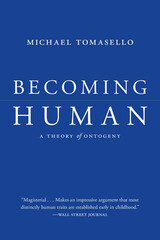
Winner of the William James Book Award
Winner of the Eleanor Maccoby Book Award
“A landmark in our understanding of human development.”
—Paul Harris, author of Trusting What You’re Told
“Magisterial…Makes an impressive argument that most distinctly human traits are established early in childhood and that the general chronology in which these traits appear can…be identified.”
—Wall Street Journal
Virtually all theories of how humans have become such a distinctive species focus on evolution. Becoming Human looks instead to development and reveals how those things that make us unique are constructed during the first seven years of a child’s life.
In this groundbreaking work, Michael Tomasello draws from three decades of experimental research with chimpanzees, bonobos, and children to propose a new framework for psychological growth between birth and seven years of age. He identifies eight pathways that differentiate humans from their primate relatives: social cognition, communication, cultural learning, cooperative thinking, collaboration, prosociality, social norms, and moral identity. In each of these, great apes possess rudimentary abilities, but the maturation of humans’ evolved capacities for shared intentionality transform these abilities into uniquely human cognition and sociality.
“How does human psychological growth run in the first seven years, in particular how does it instill ‘culture’ in us? …Most of all, how does the capacity for shared intentionality and self-regulation evolve in people? This is a very thoughtful and also important book.”
—Tyler Cowen, Marginal Revolution
“Theoretically daring and experimentally ingenious, Becoming Human squarely tackles the abiding question of what makes us human.”
—Susan Gelman
“Destined to become a classic. Anyone who is interested in cognitive science, child development, human evolution, or comparative psychology should read this book.”
—Andrew Meltzoff
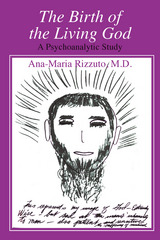

How malleable is human nature? Can an individual really change in meaningful ways? Or, are there immutable limits on the possibilities of human growth set in place by the genes and by the early experiences of childhood? These are questions which touch our deepest political and personal concerns; and they have long been a matter of fierce debate in the behavioral sciences.
Constancy and Change in Human Development takes a thorough inventory of the growing body of research which now bears upon these questions. Editors Brim and Kagan have assembled an outstanding group of specialists in human growth and commissioned them to assess questions of change and continuity in physical, mental, and emotional development throughout the life span. Beginning with three general chapters which place the ideas of continuity and discontinuity in historical and philosophical perspective, the book moves across a broad spectrum of developmental issues, ranging from the basic adaptability of the human central nervous system to the effects of social institutions which seek to promote individual change. There are chapters on physical growth, health, cognitive development, personality, social attitudes and beliefs, occupational careers, psychosis, and criminal behavior. Throughout these chapters, the recurring question is whether development can be seen as a continuous process in which early stages reliably predict subsequent events, or whether instead there are sharp discontinuities which render individual development essentially unpredictable. The variety and richness of the answers to this question provide a summary of human development which is unparalleled in any other single volume.
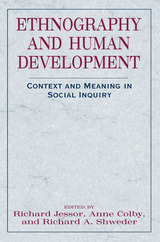
Part 1, informed by a post-positivist philosophy of science, argues for the validity of ethnographic knowledge. Part 2 examines a range of qualitative methods, from participant observation to the hermeneutic elaboration of texts. In Part 3, ethnographic methods are applied to issues of human development across the life span and to social problems including poverty, racial and ethnic marginality, and crime.
Restoring ethnographic methods to a central place in social inquiry, these twenty-two lively essays will interest everyone concerned with the epistemological problems of context, meaning, and subjectivity in the behavioral sciences.
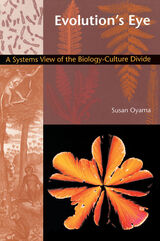
While acknowledging that, in an uncertain world, it is easy to “blame it on the genes,” Oyama claims that the renewed trend toward genetic determinism colors the way we think about everything from human evolution to sexual orientation and personal responsibility. She presents instead a view that focuses on how a wide variety of developmental factors interact in the multileveled developmental systems that give rise to organisms. Shifting attention away from genes and the environment as causes for behavior, she convincingly shows the benefits that come from thinking about life processes in terms of developmental systems that produce, sustain, and change living beings over both developmental and evolutionary time.
Providing a genuine alternative to genetic and environmental determinism, as well as to unsuccessful compromises with which others have tried to replace them, Evolution’s Eye will fascinate students and scholars who work in the fields of evolution, psychology, human biology, and philosophy of science. Feminists and others who seek a more complex view of human nature will find her work especially congenial.
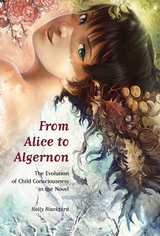
By examining the connection between authors and trends in child psychology, author Holly Blackford explains why many modern novels began to focus on child cognition as a site for intellectual and artistic exploration. In each chapter of this book, select novels of the late-nineteenth or twentieth century are paired with a specific moment or movement from the history of developmental psychology. Novels such as Mark Twain’s Huckleberry Finn and Henry James’s What Maisie Knew, or Radclyffe Hall’s less-canonical The Well of Loneliness and even Mark Haddon’s The Curious Incident of the Dog in the Night-Time, showcase major questions about human epistemology through their child characters. From Lewis Carroll’s Alice and her looking-glass to Richard Wright’s Bigger Thomas and the murder of Mary Dalton to the chaotic Neverland—symbolizing the unmappable child’s brain—a literary tradition of child consciousness has emerged as an experimental site for the unstable concepts of evolution, civilization, and development.
By situating literature about children within concurrent psychological discourses, Blackford demonstrates how the modern novel contributed to the world’s understanding of the boundless wonders and discernible limits of child consciousness.
HOLLY BLACKFORD is a professor of English at Rutgers University, Camden. She is the author of Out of this World: Why Literature Matters to Girls; Mockingbird Passing: Closeted Traditions and Sexual Curiosities in Harper Lee’s Novel; The Myth of Persephone in Girls’ Fantasy Literature; and editor of 100 Years of Anne with an ‘e’: The Centennial Study of Anne of Green Gables and Something Complete and Great: The Centennial Study of My Ántonia.
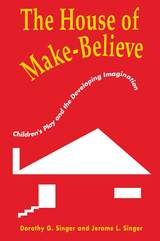
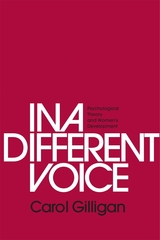
This is the little book that started a revolution, making women’s voices heard, in their own right and with their own integrity, for virtually the first time in social scientific theorizing about women. Its impact was immediate and continues to this day, in the academic world and beyond. Translated into sixteen languages, with more than 700,000 copies sold around the world, In a Different Voice has inspired new research, new educational initiatives, and political debate—and helped many women and men to see themselves and each other in a different light.
Carol Gilligan believes that psychology has persistently and systematically misunderstood women—their motives, their moral commitments, the course of their psychological growth, and their special view of what is important in life. Here she sets out to correct psychology’s misperceptions and refocus its view of female personality. The result is truly a tour de force, which may well reshape much of what psychology now has to say about female experience.

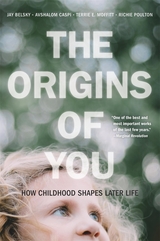
A Marginal Revolution Book of the Year
After tracking the lives of thousands of people from birth to midlife, four of the world’s preeminent psychologists reveal what they have learned about how humans develop.
Does temperament in childhood predict adult personality? What role do parents play in shaping how a child matures? Is day care bad—or good—for children? Does adolescent delinquency forecast a life of crime? Do genes influence success in life? Is health in adulthood shaped by childhood experiences? In search of answers to these and similar questions, four leading psychologists have spent their careers studying thousands of people, observing them as they’ve grown up and grown older. The result is unprecedented insight into what makes each of us who we are.
In The Origins of You, Jay Belsky, Avshalom Caspi, Terrie Moffitt, and Richie Poulton share what they have learned about childhood, adolescence, and adulthood, about genes and parenting, and about vulnerability, resilience, and success. The evidence shows that human development is not subject to ironclad laws but instead is a matter of possibilities and probabilities—multiple forces that together determine the direction a life will take. A child’s early years do predict who they will become later in life, but they do so imperfectly. For example, genes and troubled families both play a role in violent male behavior, and, though health and heredity sometimes go hand in hand, childhood adversity and severe bullying in adolescence can affect even physical well-being in midlife.
Painstaking and revelatory, the discoveries in The Origins of You promise to help schools, parents, and all people foster well-being and ameliorate or prevent developmental problems.

In his most probing and expansive work to date, Jerome Kagan—one of this country’s leading psychologists—demonstrates that innovative research methods in the behavioral sciences and neurobiology, together with a renewed philosophical commitment to rigorous empiricism, are transforming our understanding of human behavior. Contemporary psychology, according to Kagan, has been preoccupied with three central themes: How malleable is temperament? How predictable are the milestones of cognitive development? How accurate is consciousness as a window onto the self, its motives, beliefs, and emotions?
In a review of past approaches to these questions, Kagan argues persuasively that behavioral scientists have reached less-than-satisfactory answers because they have failed to appreciate the biases inherent in their frame of reference and the limitations of their investigative procedures. He calls into question a number of techniques that have been mainstays of psychological investigation: the Ainsworth Strange Situation for assessing the emotional attachment of an infant to its mother, and interviews and questionnaires as indexes of personality, to name only two. Kagan’s own research has used novel laboratory situations to discover a group of children who exhibit a pattern of behavior he calls “temperamentally inhibited”—they are restless and irritable from birth, and by twenty-four months cling to the mother and show biological signs of high anxiety in unfamiliar situations.
These findings, coupled with current understanding of the structure and chemistry of the nervous system, lead him to speculate that these children are born with a biological predisposition that favors the development of a shy, fearful personality. Through longitudinal studies of this kind, as well as through his cross-cultural investigations of cognitive development, Kagan has infused new meaning into the nature–nurture debate.
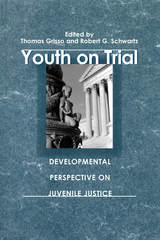
READERS
Browse our collection.
PUBLISHERS
See BiblioVault's publisher services.
STUDENT SERVICES
Files for college accessibility offices.
UChicago Accessibility Resources
home | accessibility | search | about | contact us
BiblioVault ® 2001 - 2024
The University of Chicago Press









